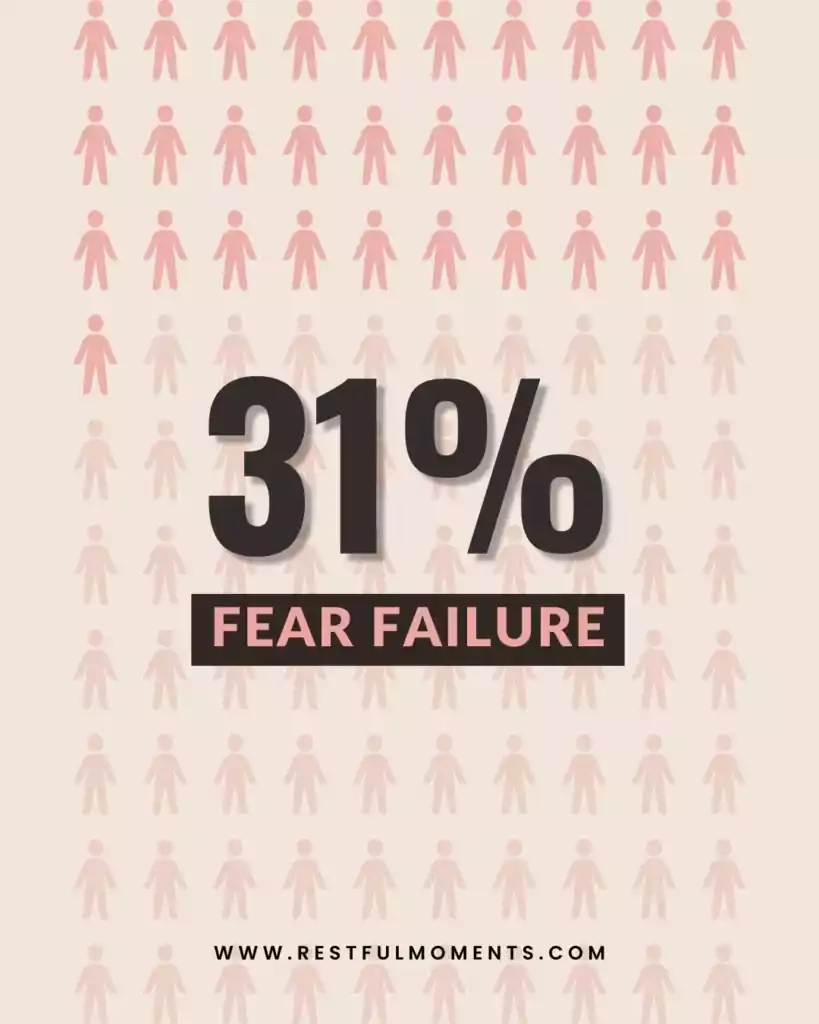
It’s a barrier that holds us back from realizing our full potential, in our careers, personal goals, or creative pursuits. What is the fear of failure, and why is it important?
The fear of failure is a common human experience that can hinder personal and professional growth. By holding individuals back from taking risks and pursuing their goals. It’s a universal human emotion that can affect anyone striving for success or facing challenges.
Learn how to overcome the fear of failure and unlock the path to success. Understand its causes and effects on individuals, and learn strategies to build resilience.
Embracing failure as a learning opportunity.
By acknowledging the fear of failure, we can develop a growth mindset and become more resilient in the face of setbacks.
What’s the fear of failure?
Imagine standing at the edge of a diving board, ready to take a leap into the pool below. But what if you hesitate, unable to jump, paralyzed by the thought of what might go wrong?
This hesitation is what we call the fear of failure.
It can make us anxious about what others think of us, stop us from trying new things, and even lead us to procrastinate on tasks we know we should tackle.
The fear of failure hangs over us when we contemplate taking on a challenge or trying something new.
It’s that nagging feeling that says, “What if I mess up?” or “What if I can’t do it?”
As one study found, this fear affects a whopping 31% of adults1Research Reveals Fear of Failure Has Us All Shaking in Our Boots This Halloween, making it more common than the fear of spiders. Easy to say, if you struggle with this, you are not alone.

That self-doubt and negative self-talk, can be relentless in highlighting worst-case scenarios.
Procrastination also play a role, how often have you told yourself you’ll do it later? Only to delay it indefinitely.
Ultimately, it’s the fear of failure itself that often becomes the barrier to overcoming it. Allow it to convince you that taking that first step is too daunting.
Now that we have explored the concept of fear of failure, let look at its causes and effects.
Where does fear of failure come from?
Well, it doesn’t just pop up out of nowhere. Various reasons can be causing it.
Past Mistakes and Failures
If you’ve stumbled before, the fear of failing again might haunt you. Negative experiences often plant the seeds of this fear.
Imagine you once tried to ride a bike without training wheels and ended up with scraped knees and a bruised ego. That memory might stick with you, and the fear of failing again can start to settle in.
Our past stumbles don’t define us; they’re stepping stones to success.
Pursuit of Perfection
Setting unrealistically high expectations for yourself can lead to fear of failure. You dread not meeting your impossibly high expectations. 2Kelly, J.D. Your Best Life: Perfectionism—The Bane of Happiness. Clin Orthop Relat Res 473, 3108–3111 (2015). https://doi.org/10.1007/s11999-015-4279-9
“Perfectionism is not the same thing has striving to be your best. Perfectionism is the belief that if we live perfect, look perfect, and act perfect, we can minimize or avoid the pain of blame, judgement, and shame. It’s a shield. It’s a twenty-ton shield that we lug around thinking it will protect us when, in fact, it’s the thing that’s really preventing us from flight.”
― Brené Brown, The Gifts of Imperfection
Low Self-Esteem
Feeling like you’re not up to the challenge can lead to hesitation. It’s like having a tiny voice in your head whispering, “You can’t do it”.
When you don’t believe in your abilities, it’s like a fog of self-doubt that can make you dread trying new things.

Societal Expectations
Society has this thing for success. The public admire those who achieve, bringing even more pressure to perform.
“Do what you feel in your heart to be right – for you’ll be criticized anyway.”
― Eleanor Roosevelt
Understanding this can help you see why we fear failure and how you can start to change those negative thought patterns.
While many people experience a normal fear of failure, there is a more extreme manifestation known as atychiphobia.
Seeking Help for Extreme Fear of Failure
It’s important to acknowledge that for some, this fear can be more than just an everyday experience.
If you find that your fear of failure is affecting your life, causing distress, anxiety, or interfering with your goals, seeking professional help can be a beneficial step toward personal growth and well-being.
How Professionals Can Assist:
- Therapists and counselors are trained to provide guidance, strategies, and support for individuals struggling with extreme fear of failure, also known as atychiphobia. They can help you delve into the root causes of this fear.
- Professionals can work with you to develop coping mechanisms and strategies to manage and overcome atychiphobia. These may include cognitive-behavioral techniques, exposure therapy, and self-compassion exercises.
- Remember, seeking help is a courageous step towards personal growth. There’s no shame in reaching out to professionals for support. They are here to assist you on your journey to conquer your fear of failure and embrace the best-case scenario in your life.
As you read through this information, if you resonate with the extreme fear of failure and its impact on your life, consider seeking the help of a mental health professional.
They can provide the expertise and guidance to help you navigate and overcome atychiphobia, leading you toward a more fulfilling and confident life.
Fear of Failure and Procrastination
You procrastinate because of anxiety, that is wasting present energy on an outcome that is undesirable to you.
Anticipation is the energy you get when the outcome you expect is desirable to you.
Fear of Not Doing Well
Imagine you’ve got a task ahead, but there’s that nagging feeling that you might not do well.
When this fear creeps in, you might procrastinate. You delay because you’re worried about not meeting your own expectations.
Fear of Making Mistakes
“What if it’s not perfect?” Perfectionism and procrastination often co-exist.
This is a clear example of how the fear of failure can be paralyzing.
Fear of the Unknown
Now, imagine you’re faced with something new, something you’ve never done before.
The unknown can be a scary place. You hesitate because you’re not sure what to expect or where to start.
Fear of Discomfort
Change can be uncomfortable, and the fear of failure can make you resist it.
It’s in human nature to seek comfort. We are fighting against our programming when we put ourselves in uncomfortable situations.
When you recognize that procrastination often stems from the fear of failure, you can start to unravel these mental blocks.

Overcoming the Fear of Failure
Now that we’ve identified the root causes of fear of failure, let’s take the next step and discuss how to overcome it.
Question the Fear
Take a good, long look at your fear. Ask yourself, “What’s the worst that can happen?” You might realize it’s not as scary as it seems.
“You gain strength, courage, and confidence by every experience in which you really stop to look fear in the face. You can say to yourself, ‘I have lived through this horror. I can take the next thing that comes along.’ You must do the thing you think you cannot do.”
― Eleanor Roosevelt, You Learn by Living: Eleven Keys for a More Fulfilling Life
Baby Steps
Imagine that you’re climbing a mountain. It’s less daunting when you focus on one step at a time, right?
Break your goals into more manageable steps. This way, you can tackle them without feeling overwhelmed. Rome wasn’t built in a day.
Seek Support
Don’t be afraid to ask for help or seek support. Friends, family, or even a therapist can be your trusty allies on this quest.
They can provide guidance, encouragement, and a helping hand when you need it most.
Embrace Mistakes
Mistakes aren’t your enemies; they’re your allies in learning.
Imagine a baby learning to walk. Falling isn’t failing; it’s part of the process. Embrace your mistakes, learn from them, and keep moving forward.
“A failure is not always a mistake, it may simply be the best one can do under the circumstances. The real mistake is to stop trying. ”
― B.F. Skinner
Positive Self-Talk
Imagine you have a cheerleader inside your head, constantly cheering you on. That’s positive self-talk. When the fear of failure whispers doubts, counter it with positive affirmations.
Tell yourself you’re capable, you’re resilient, and you can achieve your goals.
It’s about embracing the best-case scenario, knowing that stumbling is part of the path.
What if I Am More Capable Than I Realize?
In conclusion, the fear of failure is a common human experience that can hinder personal and professional growth. It holds us back from realizing our full potential and pursuing our goals.
However, by understanding the root causes of this fear and implementing strategies to overcome it, we can unlock the path to success.
Embracing failure as a learning opportunity, breaking goals into manageable steps, seeking support from others, embracing mistakes, and practicing positive self-talk are all effective ways to combat the fear of failure.
Remember, stumbling and facing setbacks are part of the journey towards success. By developing a growth mindset and resilience, we can navigate through the fear of failure and embrace the best-case scenario in our lives.
So let go of the fear, take that leap, and unlock your true potential. Your possibilities are limitless.

I’m the lady behind Restful Moments. Having experienced burnout firsthand, I embarked on a journey to redefine self-care, blending scientific insights with practical advice for the modern woman. Join our supportive community as we explore mindset, mindfulness, healthy habits, and the science behind stress management.
- 1
- 2Kelly, J.D. Your Best Life: Perfectionism—The Bane of Happiness. Clin Orthop Relat Res 473, 3108–3111 (2015). https://doi.org/10.1007/s11999-015-4279-9
